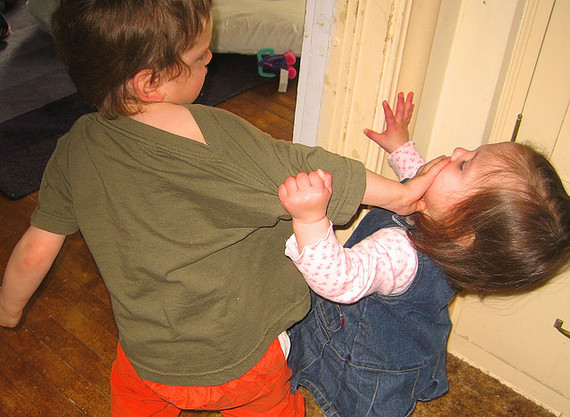By Ann Brown/ The Next Family
There are some really uncomfortable moments while raising kids. There are moments that embarrass you -- when, say, you've run into an old flame from high school and you're holding your two year old in your arms, thinking you look pretty darn fetching, and your kid says, "Mom! You have a really big bloody booger just hanging in your nose! Are you going to pick it out? Are you? ARE YOU?"
And there are moments of physical uncomfortability -- balancing the rain-soaked grocery bags on your hip as you lean into the back seat of the car to unlock the $%#@ car seat which is held in the locked position by a cement made of Nutri Grain crumbs, apple juice and spilled Go-Gurts while holding your keys in your teeth. And you have to pee really badly.
Those moments -- though they take years off our lives -- are to be expected. And we commiserate with each other, and we live through them.
There are other awkward moments in parenting, however, that are not so easily laughed off.
They occur when our friends (or cousins, or neighbors) do not share our style of parenting, and it becomes very difficult to get the families together. I'm not talking about benign differences -- you use organic mild cheddar cheese in your enchiladas and your friend serves your kid enchiladas with organic medium cheddar, or, say, you hate country music and your friend plays country music in the car when you and your kid are there.
I'm talking about the bigger differences in parenting styles. Yelling. Spanking. Allowing kids to be disrespectful. When you're in your friend's house for a play-date with the kids, and your kid comes running down the stairs, crying because the host child won't let her play with any of the toys in the house. And then the host child pushed your kid. And spit on your kid's apple.
And your friend shakes her head and says to you, "well, you know how kids are. Best to ignore it and let them work it out."
And the host child come running down the stairs and says, "I won't share my toys. She can't have any of my toys."
And your friend laughs. And pours herself more wine. And she says to her child, "say you're sorry. Then go back upstairs and be nice."
And you know that's about the worst advice she could give her kid, who is clearly not sorry and who clearly will not be nice when they go back upstairs.
And your kid looks at you with wide eyes as if to say, "Do something."
And you just stand there. Because you aren't really sure what to do.
So you mumble something about, oh, having to get home, and traffic, and needing to get to the airport, and war, and impending diarrhea. And you beat a hasty retreat to your car. And go home and change your phone number. And switch preschools. And leave the country. Because what are you going to do the next time your friend calls and invites you and your kid over to play?
Here, parents fall into a few disparate categories:
The Avoider: You pretty much just stop answering your phone. When your friend corners you about scheduling another play-date, you feign a fainting spell and collapse on the preschool parking lot. Every time.
The Ulcer-Developer: You continue to do play-dates with your friend and hope for the best. You tell your kid that you will buy him any toy he wants on the way home from the awful play-dates. You lose sleep and feel like a terrible parent.
The Bold Liar: You say to your friend, "We are quarantined. Forever." Or you tell your friend you are allergic to her carpet. Or that your religion disallows play-dates.
The Earnest Truth-Teller: "Your child is awful. We hate him. I can't believe you don't hate him, as well."
None of these strategies end well. And that is the bad news. There really is no one perfect way to extricate yourself from a situation where you don't want your child to hang out with the child of someone who is/was your friend.
But there is some good news.
You can be very clear with yourself about where your loyalties lie. (They lie with your child. Please tell me you already knew that.) And in that clarity, you will realize that it doesn't matter if the result of what you tell your (soon-to-be ex, perhaps) friend is that you are un-friended on Facebook, or trashed to the larger community, or kicked out of the book club or looked askance upon by the friends of your ex-friend. Because what matters is that you do the right thing by your child.
Your children need you to validate that you share the same values with them. So if a child grabs a toy from your kid and doesn't give it back, or treats your child disrespectfully, and you keep going back to that child's house for play-dates because you don't want to jeopardize the relationship with the parent, the message you're giving your child is that it's okay to be treated badly.
Finding the exact right words to say isn't as important as just getting the message right. And kids can understand that we sometimes flail for a while when we're trying to deal with a sticky situation. But remembering that you are not there to change the other parent, and remembering that using the "I" message always saves the day ("I am not comfortable with the way the kids are playing together. I want to take a break from play-dates"), and -- finally -- remembering that the values you hold for your child are your guiding lights, you'll find your way through it.
And if you don't, I have a wig and sunglasses you can use around town.
Photo Credit: Sharon Mollerus
Other articles you might like:
